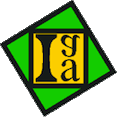

IGA/AMSI Workshop |
Organisers
| Peter Bouwknegt Department of Theoretical Physics Research School of Physics and Engineering and Department of Mathematics Mathematical Sciences Institute Australian National University Canberra, ACT 0200 Phone: (02) 6125 2969 Fax: (02) 6125 4676 E-mail: peter.bouwknegt@anu.edu.au |
Mathai Varghese School of Mathematical Sciences University of Adelaide North Terrace, Adelaide, SA 5005 Phone: (08) 8303 4173 Fax: (08) 8303 3696 E-mail: mathai.varghese@adelaide.edu.au |
Snigdhayan Mahanta School of Mathematical Sciences University of Adelaide North Terrace, Adelaide, SA 5005 Phone: (08) 8303 1604 Fax: (08) 8303 3696 E-mail: snigdhayan.mahanta@adelaide.edu.au |
Pedram Hekmati School of Mathematical Sciences University of Adelaide North Terrace, Adelaide, SA 5005 Phone: (08) 8303 5261 Fax: (08) 8303 3696 E-mail: pedram.hekmati@adelaide.edu.au |
 |
 |
 |
![]() Click
here to return to the IGA Website
Click
here to return to the IGA Website